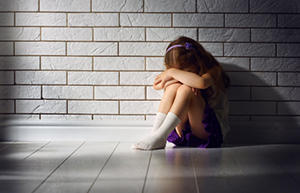Children, like adults, are affected by thoughts and experiences and sometimes these manifest themselves in the form of fears. Fortunately, most of these fears go away as the child gets older. While having to deal with a fearful child will often cause parents to worry or become frustrated, psychologists believe that the existence of childhood fears, especially in young children, is indicative of high cognitive development. Children with a vivid imagination are more likely to experience fears because of the increased activity that is taking place in their brain.
Where Do Childhood Fears Come From?
Children all have different fears because no two people think the same thoughts or have the same experiences. Fears can come to the fore after listening to stories, watching TV or listening to the radio. Some fears are not the result of fantasies, though, but may come about as a result of a real life occurrence. Whatever a child finds threatening or traumatic becomes feared and this is actually a natural self-preservation response. But sometimes the fear is more imagined than real and in a child's world anything that causes discomfort is a big deal and will be avoided at all costs.
Parenting A Fearful Child
As adults, we often take childhood fears lightly and we laugh at what we consider irrational fears. However, it is important to listen carefully to your children and treat their concerns with respect so that they will be more inclined to talk about it than to hide it for fear of being ridiculed. Many parents themselves may be holding onto fears left over from their own childhoods. It is never too late to delve into your fears and talk it out. Maintain your physical health via a healthy diet, nutritional products and exercise, is only half the battle. Taking care of your mental health is crucial as well.
Parents should also try to be level headed and positive because children will often mimic parents' response to situations. If you project fear of something, your child will pick up on it, but if you exhibit bravery, your child may strive to emulate you.
Childhood fears are generally experienced as very much real and simply asking a child to be courageous will generally not help, and may serve to simply make matters worse. Instead of doing something counterproductive, parents should reassure their child that they will shield them from potential danger. It is also a good idea to get your children to acknowledge their fears and then sit together as a “team“ to explore possible solutions. While our protective instinct may be to shield children from facing their fears, this is by no means the right approach because they may interpret this to mean that their fears are well founded and will only serve to increase their fear.
Psychologists maintain that one of the best ways to counter childhood fears is to gently guide a child into facing their fears. For example, if a child is afraid of birds, you could consider taking him or her to a local park, then gently encourage the child to feed the birds, as this is likely to change their perspective and help eliminate their fear.
However, some fears cannot be treated so easily and whenever fears are so severe that they prevent children from functioning then the parents should seek professional intervention. Recent studies show that 5 out of 100 children develop severe childhood fears that become phobias. The general solution to this problem is to have a professional talk your child through their fears, enabling them to break the problems down in order to find practical solutions. This is cognitive-behavioral therapy and is effective in children aged 4 and older.












